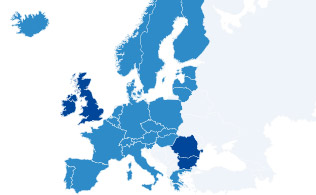
Get Your Schengen Insurance
- Hospitalisation expenses up to 30,000€
- Assistance in the event of illness/injury and death
- Coverage in the Schengen area
Extend Your Coverage
- Hospitalisation expenses up to 60,000€
- Assistance in the event of illness/injury and death
- Coverage in the Schengen area + European Union
- Return/relocation and lodging expenses of a companion

Before traveling, please check the guidelines provided by the World Health Organization, the European Union and your local government. Important restrictions are applied to the Schengen Area and visas are likely to be limited to specific travels only. Our travel insurance policies are made to protect you against unforeseeable events, such as sudden illnesses or accidental bodily injuries. We remind you that epidemics and/or infectious diseases such as CoVid 19 are excluded from our policies.


Schengen travel insurance
Europ Assistance makes it easy for you to select and purchase your travel insurance online. Your insurance will be ready in a matter of minutes and our insurance certificates are recognized by embassies, consulates and visa centers around the world , which helps you acquire a Schengen visa for your next trip to Europe. You will immediately receive the certificate and you will be able to download it at any time in any of our six languages : English, French, Spanish, German, Russian or Chinese.


Which countries are in the Schengen area?
The Schengen area is made up of 26 countries (and 3 microstates) where travelers and residents can move freely from state to state without a passport, as there is no longer common border control between Schengen states. Travel insurance is highly suggested for all travelers, and for most countries is mandatory , as it is needed to obtain the visa to enter the Schengen area. You can obtain your visa application form from the country you plan to enter through first or the one you plan to spend the most time in.

The leading Schengen travel insurance provider
When you choose Europ Assistance as your Schengen visa travel insurance provider, you also get the support and expertise of 750,000 partners . If something goes wrong, not only will your medical expenses be properly reimbursed, but you will also get help from competent medical professionals at qualified medical centers, no matter where you are. During stressful situations or emergencies abroad, communicating in your native language can be a source of comfort. When such a situation occurs, you can trust that Europ Assistance will be there to help you 24/7 .

If you wish to subscribe for more than 20 people, please contact us
Travel dates
- Country of residence All travellers are from the same country of residence : Yes No
A Schengen visa is not required for your trip, however, you should still consider purchasing travel insurance. You can travel with peace of mind and are covered throughout the European Union with our Schengen Plus cover.
- Hospitalisation expenses up to 60,000€
- Coverage in the Schengen area + European Union

IMAGES
VIDEO
COMMENTS
We will cover your medical costs related to Coronavirus provided you haven't travelled against World Health Organisationor any other government body’s advice in your home country or the country you ar…
Buy online your Schengen travel insurance and get a certificate recognized by embassies and visa centers. Choose from two coverage options and get assistance in case of illness, injury or death.
What Is Schengen Visa Insurance? Those who need to secure a Schengen visa must meet several requirements, including purchasing medical travel insurance. Schengen visa insurance must provide...
Do you need Schengen insurance? Buy your AXA travel insurance online. Get a Schengen visa travel insurance policy now. Submit the certificate with your visa application. Take advantage …
Learn how to get travel insurance for the visa-free Schengen Zone, which covers 27 European countries with no internal border checks. AXA offers medical, trip cancellation, and Covid …
Here is a quick and easy guide to compare Schengen travel insurance offers and choose the best one for you: the one meeting all the requirements demanded by embassies and …
Schengen travel insurance is a type of insurance policy for travelers visiting the Schengen area. This type of travel insurance plan is designed specifically to comply with Schengen visa criteria of minimum …